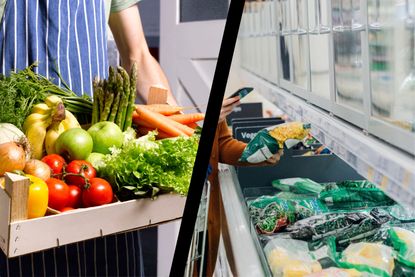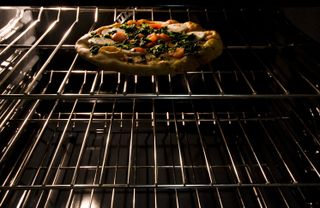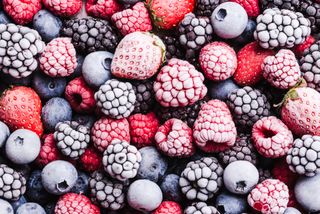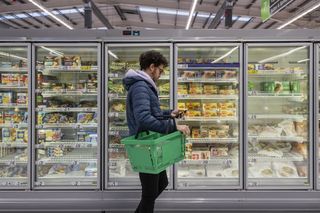Fresh vs frozen food – which is cheaper?
Is frozen food cheaper than fresh? We compare the buying, cooking and nutritional costs of switching to frozen food


With rising prices squeezing household budgets, can you make savings by switching from fresh to frozen food in the supermarket?
Households are switching from buying fresh food to cheaper frozen foods as rising food prices bite into budgets, the boss of the UK’s largest supermarket Tesco has said.
According to data from Kantar, the demand for frozen prepared foods such as pizza, chips and ready meals rose by 2.6% and demand for frozen chicken increased by 5.9% in the 12 weeks to 20 March.
In an interview with the BBC, Ken Murphy, chief executive of Tesco, said shoppers were "managing their budgets much more tightly" and had changed their behaviour by "trading down" to cheaper food and own brand products.
Can you really make big savings buying frozen food? Let’s find out.
Fresh vs frozen food
Fresh vs frozen food - which is cheaper?

Food prices are rising at their fastest rate for 45 years. The latest official figures revealed food price inflation hit 18.2%, up from 16.8% in January 2023.
Every penny you can save counts and, if as Tesco claims, households are switching to frozen food – can you really make a saving? We looked at the prices of 10 popular food types* – frozen vs fresh.
Look After My Bills Newsletter
Get the best money-saving tips, tricks and deals sent straight to your inbox every week. Make sense of your money in partnership with The Money Edit.
| Food type* | Frozen | Cost per kg | Fresh | Cost per kg | Price difference per kg |
|---|---|---|---|---|---|
| Peas | Tesco Garden Peas 1kg £1.25 | £1.35/kg | Tesco Hand Shelled Garden Peas | £10.49/kg | £9.59 |
| Chips | Tesco Homestyle Straight Cut Oven Chips 950G | £1.95/kg | You Say Potato Fresh Cut Chips 500G | £2.70/kg | £0.75 |
| Fish fillets | Tesco Wild Salmon Fillets 500G | £11.10/kg | Tesco 2 Boneless Salmon Fillets 260G | £18.27/kg | £7.17 |
| Pizza | Tesco Stonebaked Thin Four Cheese Pizza 330G | £4.40/kg | Tesco Stonebaked Margherita Pizza 252G | 13.90/kg | £9.50 |
| Sausages | Tesco 20 Pork Sausages 900G | £3.22/kg | Tesco 8 British Pork Sausages 454G | £5.07/kg | £1.85 |
| Plain chicken | Tesco Chicken Breast Fillet 1Kg | £6.00/kg | Tesco British Chicken Breast Portions 950G | £6.32/kg | £0.32 |
| Breaded chicken | Tesco Breaded Mini Chicken Fillets 300G | £9.17/kg | Tesco Breaded Chicken Mini Fillets 305G | £10.82/kg | £1.65 |
| Broccoli | Tesco Broccoli Florets 900G | £1.39/kg | Broccoli Loose | £1.92/kg | £0.53 |
| Carrots | Tesco Chantenay Carrots 600G | £2.33/kg | Tesco Chantenay Carrots 500G | £2.00/kg | -£0.33 |
| Roast Potatoes | Tesco Roast Potatoes 800G | £0.95/kg | Tesco Crispy Roast Potatoes 450G | £5.56/kg | £4.61 |
*Most popular frozen food types, according to Birds Eye research, 2018. Prices were checked on 17/04/23 using the Tesco website.
Total savings buying frozen food (per kg): £29.52 (71.5% saving), an average saving of £2.95 per item.
Is frozen food more expensive to cook?

There is usually just a difference of a few pence between the cost of cooking fresh food versus frozen food. But cooking time is king. The longer the cooking time, the more it will cost to cook. If you’re cooking a frozen pizza, for example, a cheese meltdown pizza from Tesco, it requires around 16 minutes in the oven at 200 °C (180°C fan assisted).
Uswitch has told The Money Edit that 17 minutes of cooking a frozen pizza costs around 19.3p to use the oven. Fresh pizza requires around 15 minutes of cooking time and costs around 17p to cook in the oven. With some foods, you might also want to take into account the defrost time, which could reduce oven time.
Is frozen food less healthy than fresh?

But just focusing on the price of food might come at a cost for your health, depending on the food you are freezing. Frozen foods are known to be easy and quick, which is why a lot of people opt for them, but are often more unhealthy.
Nutritionist and head of Diets Debunked, Kate Hilton said: “I think the idea that frozen food is more unhealthy is a misconception; it really depends on what food it is that you are purchasing which will dictate whether it is more unhealthy or not.
“In fact, fruits and vegetables are often considered more nutritious when bought frozen rather than fresh, as they are picked at peak ripeness and that quality is preserved once it is flash frozen.
“But, I understand the majority of foods in the frozen aisle are convenience foods, meaning foods which are quick, cheap and easy to cook. These foods do tend to be higher in saturated fat, salt and sugar, and often have little in the way of vitamins and minerals, meaning they would be considered more unhealthy.”
“Choosing minimally processed meats (such as plain frozen chicken breast or mince) will be a better choice nutritionally than breaded options.”
“Equally, certain plant-based alternatives such as Quorn or seitan can be a nutritious choice too; Just double check the label to ensure there isn't lots of added sugar, salt or saturated fat,” Kate adds.
The verdict

It’s clear you can make big savings by switching to buying frozen food at the supermarket, with an average saving of £2.95 per kg for the 10 popular items that we checked.
While most of the frozen food we found is sold in larger portions it will also keep a lot longer in the freezer, meaning you can use what you need and leave the rest in the freezer – reducing food waste.
And with the majority of frozen food, the few pence more it might cost to cook is more than offset by the savings you make buying it in the first place.
Plus if you’re worried about the nutritional value of what you eat the good news is that lots of frozen fruit and veg are frozen within a few hours of being picked, meaning they can keep more of the nutritional good stuff like essential vitamins and minerals than some fresh foods which can take days to get to supermarket shelves.
Related articles
- Slow cooker vs oven - which is cheaper?
- Heated airer vs dehumidifier - which is the cheapest way to dry clothes indoors?
- Air fryer vs microwave- which one is cheaper to run?
- Is a dishwasher cheaper than hand-washing?
- Is a wood-burning stove cheaper than central heating?
- How to lower your boilers flow temperature and save £112 on your bills
- Is it cheaper to leave your heating on all day?
- Will putting cling film on the window lower my energy bills?

Vaishali graduated in journalism from Leeds University. She has gained experience writing local stories around Leeds and Leicester, which includes writing for a university publication and Leicester Mercury.
She has also done some marketing and copywriting for businesses.
When she is not writing about personal finance, Vaishali likes to travel and she's a foodie.
- Adam FrenchEditor, The Money Edit
-
 Three energy firms pay £8m in switching compensation - has your provider paid out?
Three energy firms pay £8m in switching compensation - has your provider paid out?More than 100,000 customers have received compensation after changing providers, but is now a good time to switch energy suppliers?
By Tom Higgins Published
-
 Save £300 on your supermarket shop with cashback accounts
Save £300 on your supermarket shop with cashback accountsBanks, credit card companies and cashback sites are all offering cashback on your supermarket shop, but can you use them all to max out your savings?
By Vaishali Varu Published
-
 Save on petrol: how to save 5p off a litre of fuel at Morrisons
Save on petrol: how to save 5p off a litre of fuel at MorrisonsPetrol prices may have been falling since last summer but every penny counts at the pump. Here’s how to save 5p a litre at Morrisons for a limited time
By Sue Hayward Published
-
 Morrisons relaunches discount scheme with cheaper prices for loyal shoppers
Morrisons relaunches discount scheme with cheaper prices for loyal shoppersMorrisons is the latest supermarket to revamp prices and offers for its loyalty scheme members
By John Fitzsimons Published
-
 Coronation freebies and discounts: what’s up for grabs
Coronation freebies and discounts: what’s up for grabsFrom free railcards and holiday giveaways to discounts off food, we highlight the special offers launched to mark the coronation of King Charles III
By Ruth Emery Last updated
-
 8 ways to get interest-free money if you’re struggling
8 ways to get interest-free money if you’re strugglingHere are 8 clever ways to get interest-free income if you’re struggling with the rising cost of living
By Vaishali Varu Last updated
-
 Best birthday freebies and discounts
Best birthday freebies and discountsEnjoy your special day with these birthday discounts and freebies - we highlight 22 of the best offers
By Vaishali Varu Published
-
 Festival ticket scam warnings – how to protect yourself
Festival ticket scam warnings – how to protect yourselfConcert ticket scams have rocketed by more than 500% over the past year, while festival fraud has more than doubled. Here’s how to keep yourself safe ahead of the festival season.
By Tom Higgins Published
-
 Co-op Member Prices: Supermarket unveils discount scheme for loyal shoppers
Co-op Member Prices: Supermarket unveils discount scheme for loyal shoppersNew Co-op scheme means reduced prices for shoppers who join the co-operative. How much does it cost to join, and how does it compare to similar schemes run by Sainsbury’s and Tesco?
By John Fitzsimons Published
-
 Emergency alert test: what to expect and how to avoid being scammed
Emergency alert test: what to expect and how to avoid being scammedWe tell you everything you need to know about the UK’s first emergency alert test, which takes place this Sunday
By Vaishali Varu Published